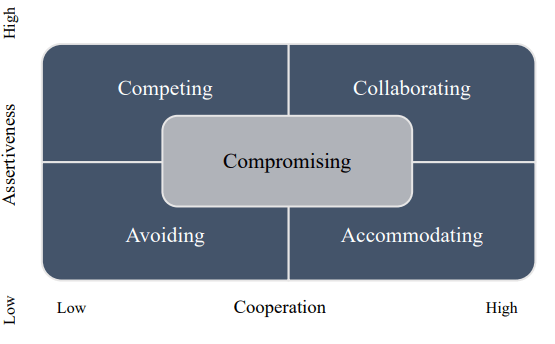It is only natural that conflict arises during the process of change. Wouldn’t it be boring if we all agreed? How conflict is addressed and resolved is important for the health of the school. Ignoring or walking away from the ‘fight’ is not going to help progression. Actively listening to each other’s ideas and perspectives promotes healthy work relationships. Different people have different methods of dealing with conflict as outlined below:
On completing a questionnaire to help establish which was my preferred mode of dealing with conflict I discovered I am predominately Competing (9), followed by Collaborating (8), and then Compromising (7). When answering the questionnaire, I was thinking about my reactions to various events involving my family, work and friends’ circles. I think depending on who we are with we deal with conflict differently. For example I have a close working relationship with my immediate department and do not hesitate in making suggestions and expressing my ideas, however in a general staff meetings or bigger working groups with members from all departments I am more passive and tend to hold back.
My least preferred method or style was Avoiding (4). This did not surprise me as I dislike people who are passive/aggressive and huff and puff but will not tell you what is wrong. I do not like brooding and if something is on my mind I will tell you.
In future I need to be mindful that I am actively listening to all members of any groups I am part of so that I listen for the absence of opinion and encourage participation of all members. Silence is not always agreement! My teenage daughters have taught me that lesson.
Arash, R., & Nasrin, A. (2015). The relationship between principals’ reward power and their conflict management styles based on Thomas–Kilmann conflict mode instrument. Management Science Letters, 5(6), 611-618. doi:10.5267/j.msl.2015.4.004

